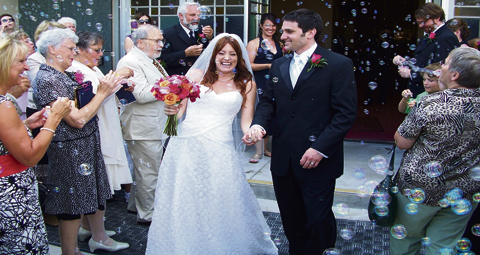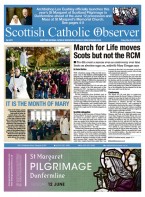October 14 | ![]() 0 COMMENTS
0 COMMENTS ![]() print
print

The key is communication
— In the second part of our series on the Sacrament of Marriage, MARY McGINTY looks at the work done by groups like Scottish Marriage Care and Marriage Encounter who help to prepare young Catholic couples for a lifetime of love and commitment
Faithful, fruitful and permanent are defining features of successful Christian marriage and these are among the many aspirations of couples as they prepare for their wedding day and the life together that will follow. When the glamour of the dress, the festivities of the reception and joy of the honeymoon are over, the real business of married life begins. While many couples opt to live together, those choosing marriage have every reason to be look to the future with hope and optimism. The statistics relating to marriage versus co-habitation all show better health, wealth and happiness on average for married couples. Educationally children of married couples also fare better. With divorce and separation no longer unusual, even in Catholic marriages, young couples are now less likely to benefit from the example of their parents’ marriage. Added to the complexities of modern living and the many dilemmas it holds the need for marriage preparation is more necessary than ever.
Church commitment
As part of the Church’s commitment to preparing couples for the Sacrament of Marriage they are strongly encouraged to participate in the FOCCUS (Facilitating Open Couple Communication Understanding and Study) programme run by Scottish Marriage Care where the emphasis is on early intervention and good communication.
Using FOCCUS as a tool, in the first of two sessions, the couple each answer a questionnaire which is then analysed by a computer programme to show areas of particular strength or weakness in the relationship. Marion Laird, Scottish Marriage Care’s head of services development, is quick to point out that there are no right and wrong answers but merely responses which are indicators for areas which need discussion.
“Some couples are a little resistant since they may have known each other for years and have even perhaps been living together,” Ms Laird said. “Naturally they think they know everything there is to know about each other. We always tell them that there is no pass or fail, but it is more about developing insight and deepening their understanding of themselves and their relationship, and from there they can strengthen the bond they already have. Even the process of filling out the questionnaire gets them really thinking about their relationship and can tease out areas which they need to talk about. FOCCUS gives them a platform to talk about things they have had a reluctance to talk about.”
For most couples, the Scottish Marriage Care input lasts for just two sessions but having received the feedback some decide that there are issues which could trouble them in the future if not dealt with and so opt for a few sessions of counselling before the problems become embedded in the relationship. Another very positive aspect is that it has been proven that having worked with Marriage Care, couples who experience problems in the future are more likely to return for help.
Varied guidance
Although it is a generic marriage preparation tool, FOCCUS comes in several forms for Catholic marriage. As well as a version for couples who are both Catholics it also caters for mixed marriages and for couples who are already civilly married.
Response to questions about their agreement that ‘Sacramental Marriage means that we intend to pledge love under all circumstances’ and the importance of Christ’s presence in their union give indicators of any possible concerns. Others such as ‘our inability to share faith leaves me lonely at times’ give an opportunity to share the Catholic partner’s depth of feeling for the faith and can open up discussion on possibilities of how it might be shared.
“It is vital that they have this discussion,” Ms Laird said. “Even when they are both Catholics they may well have different levels of involvement in the Church. And when it comes to raising children they might have different views on that. When only one partner is a Catholic they need to talk about how the other supports them in the practice of their faith. Being married is about all of who you are. It is not as though you can section off one part of yourself. If your faith is important you must be able to practise it as you want and your partner needs to support you in that.
“The different sections in FOCCUS bring these issues out into the open and teaches them the necessity of listening to each other. One of the lovely things we see now is that often the non-Catholic partner in the marriage will attend Mass, especially when the children come along.”
Questions
The questions in FOCCUS probe attitudes to issues such as family life, communication and finance with money matters now one of the dominant areas which couples need to bring into the open.
“We see quite a lot of foreign couples now and sometimes what we see is that the man thinks he should be looking after the woman while she may have a career and financial independence so it may just be as simple as facilitating a discussion about a joint bank account. But whether it is finances or faith the key is communication. While the programme is a moment of time and a snapshot it lets them look to the future and the things that will come up for them,” Ms Laird said.
— To find out more about Scottish Marriage Care call 0845 271 2711 or visit: http://www.scottishmarriagecare.org
Marriage Encounter encourages celebration of love and commitment
The Sacrament of Marriage binds a man and a woman in an exclusive and lifelong union. Through the Marriage Encounter movement couples are encouraged to celebrate their love and commitment to each other.
Founded by a Spanish priest, Fr Gabriel Calvo, in 1950 the programme he devised offered talks for married couples which concluded with questions for the couples. In their discussion of the questions they were encouraged to be as open and honest as possible with each other. Quickly spreading to the US and Europe the movement soon came to the UK.
Marriage Encounter was particularly well-known in Scotland during the late 1970s and 1980s after the success of the first weekend in the Passionist house at Coodham near Kilmarnock. As a new age in communication dawned, Marriage Enrichment Weekends encouraged couples to make the deepening of their relationship a priority. Taking time-out of their daily lives to focus on enriching their relationship became popular with couples in parishes across Scotland.
Although places on the weekend are not as sought-after as they once were organisers who see couples renew their joy in their relationship through Marriage Encounter are keen to promote it. Emphasising the beauty of belonging exclusively to each other Marriage Encounter teaches that marriage is a joyous celebration of God’s plan for men and women.
During the weekend three presentations on various aspects of marriage are led by a priest and other couples whose marriages have already benefited from Marriage Encounter. Through the thought-provoking experience of the weekend couples see the importance of sharing their hopes, fears, joy, differences and needs and they have greater confidence in expressing their feelings.
The apostolic nature of Marriage Encounter has led to the development of other initiatives such as Beginning Experience, Choice and Retrouvaille which have all have their special place in the hearts of the people they have helped.
— http://www.marriageencounter-scotland .org.uk











